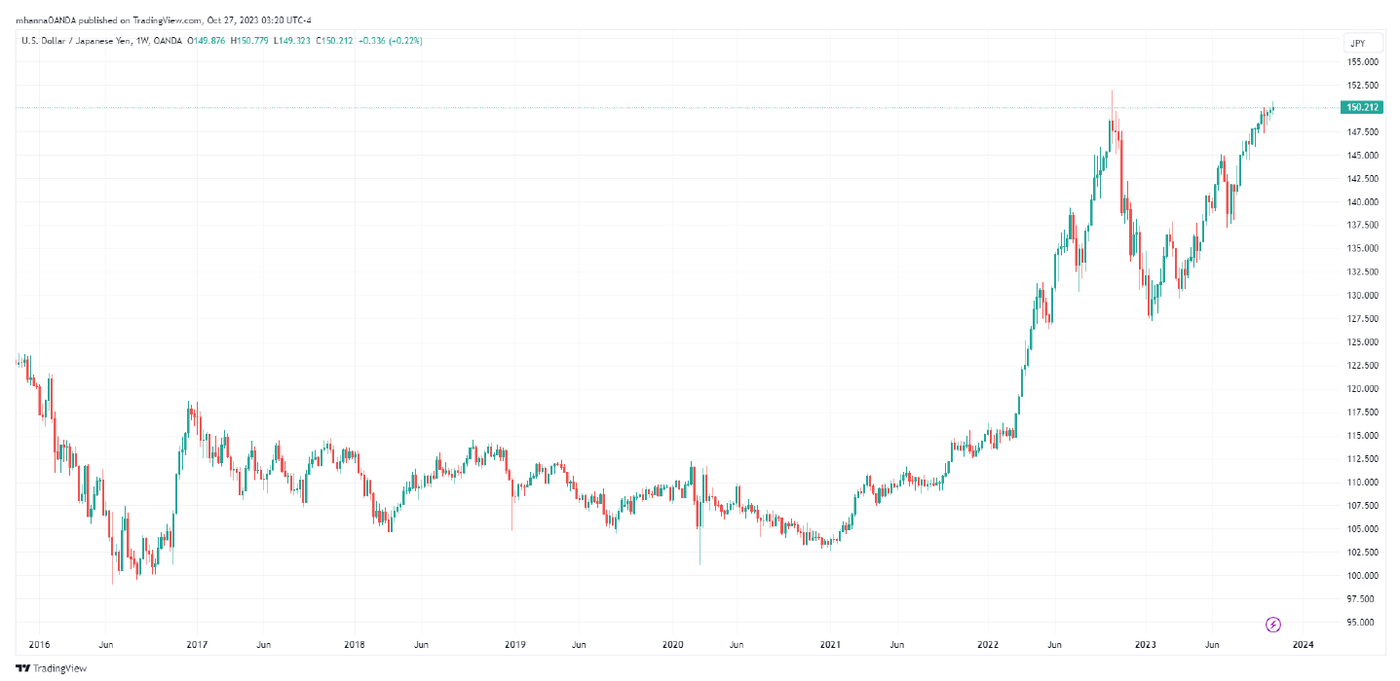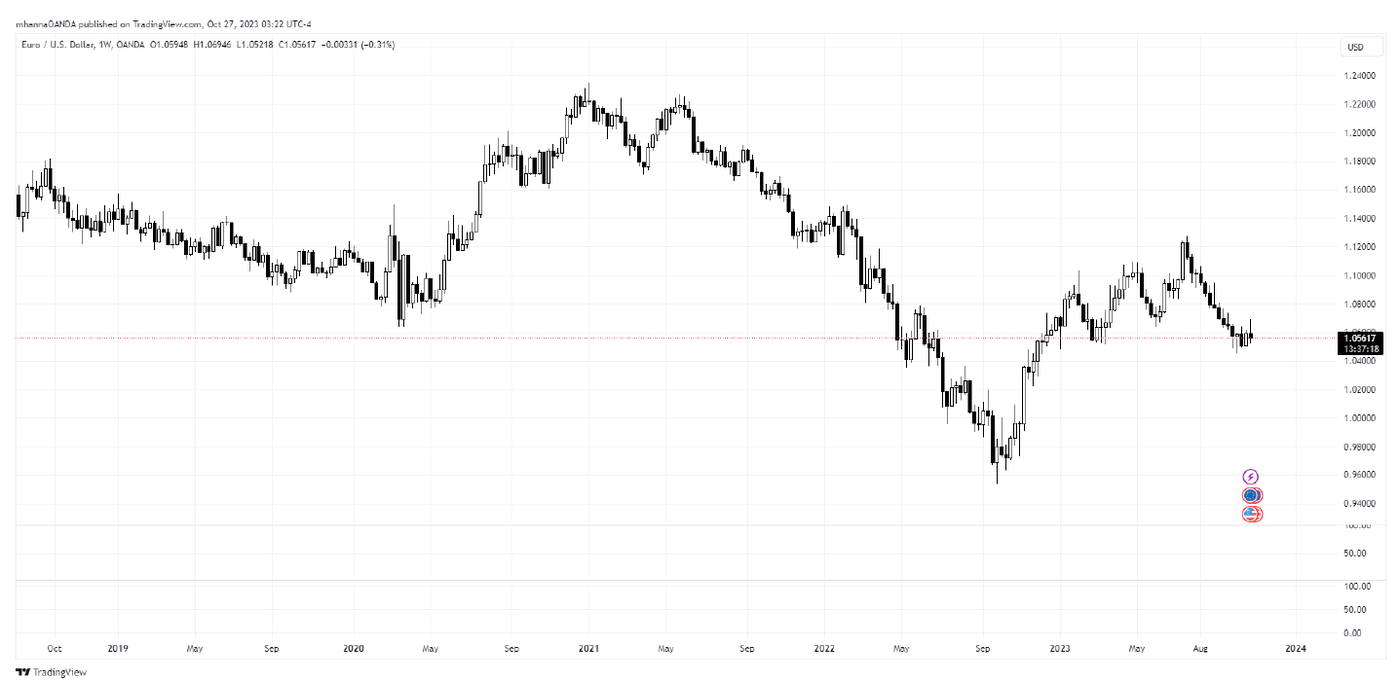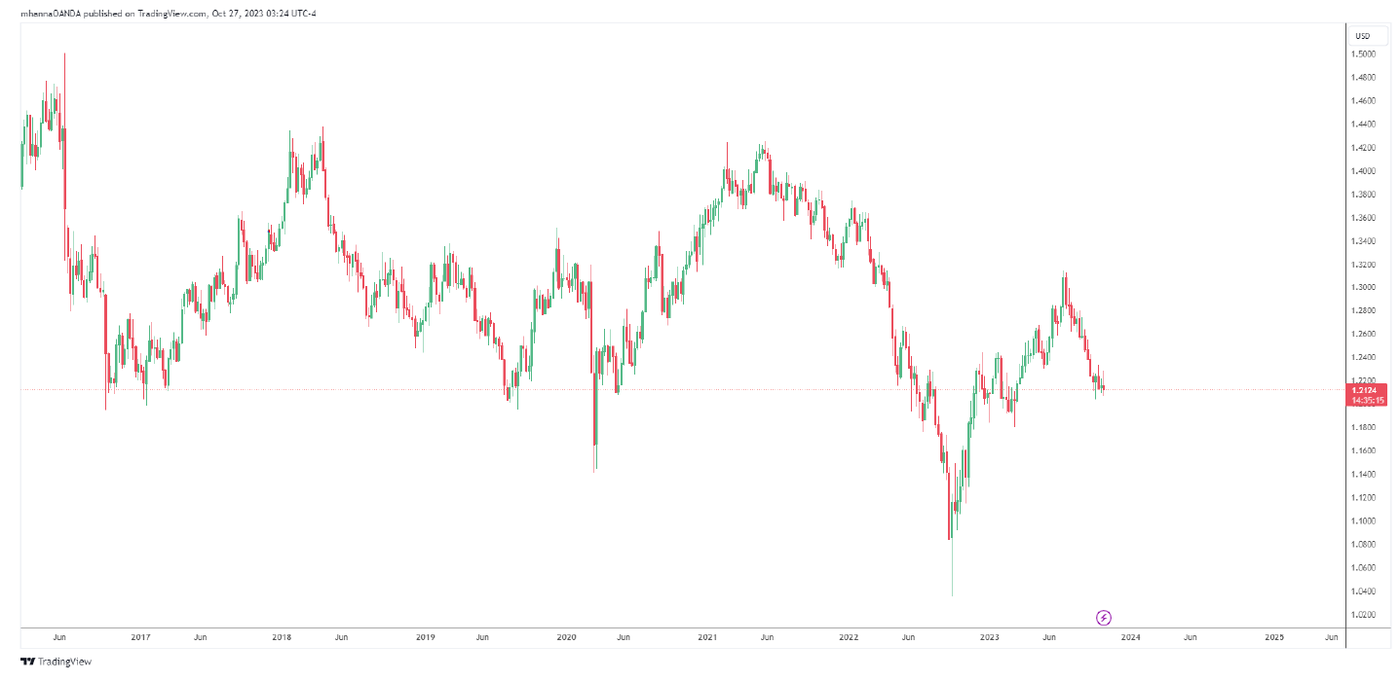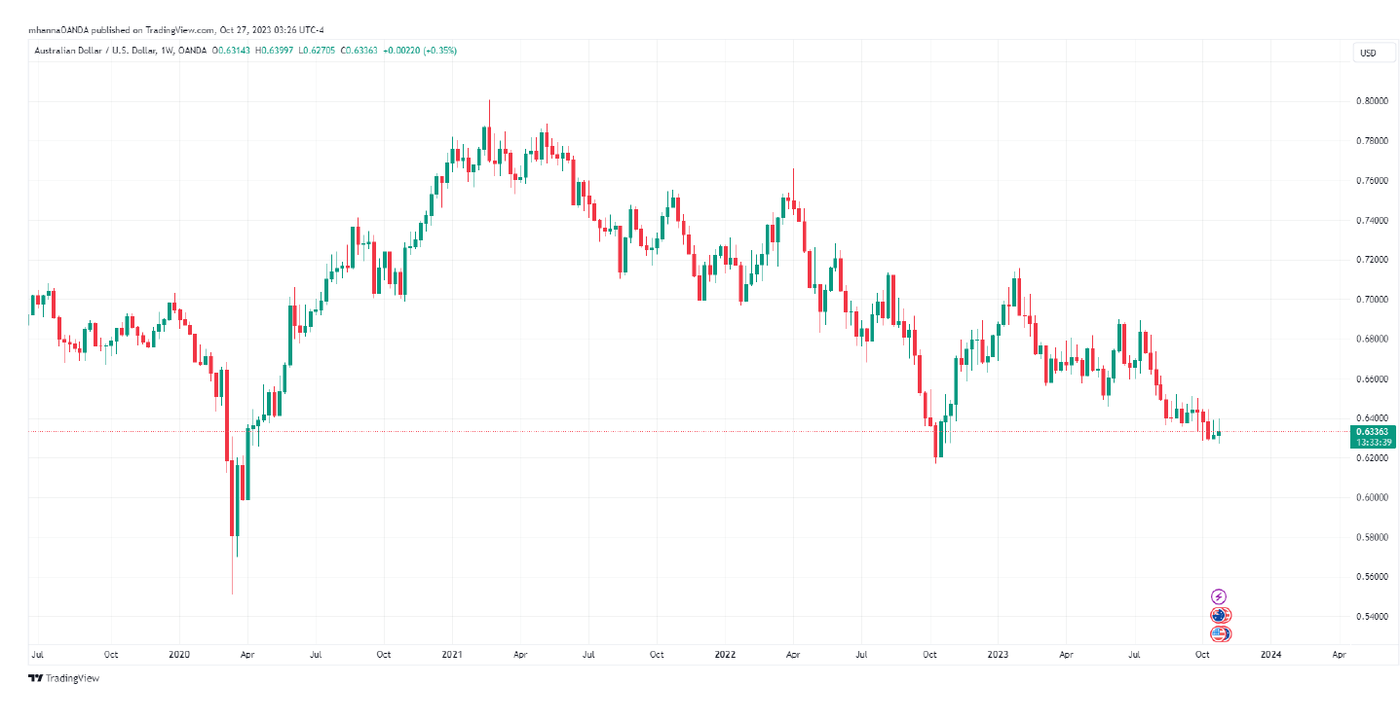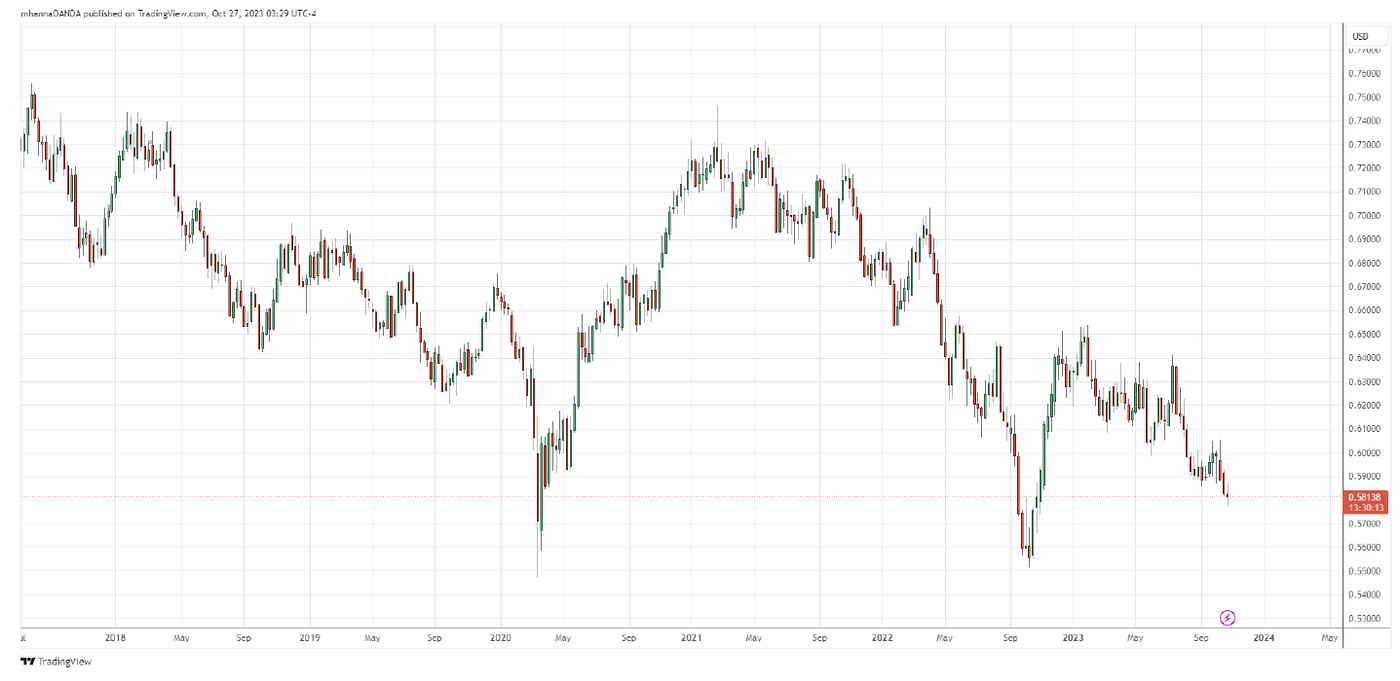Which currency pairs are the most interesting to consider as part of your forex trading strategy in November 2023? This article uses fundamental analysis and price action to explore the top 5 FX pairs to watch this month.
A Pivotal Month For Central Banks
It promises to be an exhilarating end to the year in financial markets with a raft central bank meeting taking place, regular releases of major economic data and even the potential risk of currency interventions.
With that in mind, here are five currency pairs to watch in your forex trading in November and what you should be on the lookout for over the course of the month.
USD/JPY – Traders wary of further yen intervention
This has been a fascinating forex pair to follow for a long time due to the divergent monetary policies of the two central banks. While the US Federal Reserve has raised the Fed Funds Rate by more than 5% since March 2022, the Bank of Japan has left its Policy Rate at -0.1% and continued its Yield Curve Control (buying bonds to keep yields within a pre-defined range).
That has had massive implications for the yen, which has depreciated rapidly against the dollar. In response, on a couple of occasions last year, the Ministry of Finance reportedly intervened in the FX markets via the Bank of Japan by selling foreign currency and buying the yen in order to strengthen its currency.
On 3 October 2023, the yen rapidly strengthened against the dollar again, prompting speculation that another intervention had taken place shortly after the pair moved above 150. It was never confirmed but served as a reminder to traders, along with repeated warnings from Finance Ministry and BoJ officials, that interventions could happen at any time without warning. With the USD/JPY pair trading around these levels again, another intervention is possible.
EUR/USD – A hawkish hold from the Fed?
The headline event next month is undoubtedly the Federal Reserve meeting on the opening day of it. The central bank is expected to leave interest rates unchanged at that meeting but the text and press conference that accompanies it will be heavily scrutinized. At the last meeting, the Fed signalled that it’s not done raising interest rates and traders may be keen to hear whether that remains the case. The ‘higher for longer’ mantra will likely caveat anything the Fed says on interest rates, with the central bank keen to reinforce its commitment to getting inflation sustainably back to target.
The US labor market has been a consistent source of strength for the economy and concern for the Fed. It believes unemployment needs to rise – thereby creating more slack in the economy – in order for wages to sustainably fall to levels consistent with inflation returning to target and staying there. While there has been modest cooling in the data, it hasn’t been nearly enough to satisfy policymakers who will no doubt be eyeing this report with keen interest.
As they will the CPI report in the middle of next month as it provides the first insight into inflation in October. While not the central bank’s preferred measure – that is the Personal Consumption Expenditure Price Index, usually released a few weeks later – it does offer important insight into inflationary trends and whether progress is being made in difficult conditions.
EUR/USD has trended lower over the last few months as the resilient US economy has boosted the dollar at a time when the euro has been weighed down by the threat of a recession. If the US data continues to perform well, financial markets will likely price in its rates staying high for even longer which could further support the greenback.
GBP/USD – Another close vote likely but BoE convinced inflation will fall sharply in October
The Bank of England surprised markets in September when it voted to leave Bank Rate unchanged at 5.25% even while inflation was at the time 6.7%. The vote was extremely close with five of the nine members of the Monetary Policy Committee (MPC) voting for the pause and four voting for a hike.
Wage growth and inflation have since cooled slightly, although Governor Andrew Bailey has since declared that a much steeper drop in the latter is expected in October. The next vote on 2 November is likely to be very close again and to make the meeting even more intriguing, it will be accompanied by new economic forecasts and a press conference with Governor Bailey and some of his colleagues.
We’ll then have to wait until the middle part of the month for some of the bigger economic indicators for the UK such as CPI inflation, jobs figures, retail sales and GDP.
The pound has been trading lower on the back of the BoE decision not to raise interest rates at the last meeting and adopt a less hawkish position. GBP/USD has fallen quite sharply over the summer as this move has coincided with a stronger US dollar.
AUD/USD – Will recent inflation data encourage the RBA to raise rates?
The Reserve Bank of Australia (RBA) has left the Cash Rate unchanged at 4.1% for four consecutive meetings but recent inflation data has increased the probability of another increase on 7 November. Governor Michele Bullock said the recent CPI figures were “pretty much where we thought” based on data since their last projections, but in those inflation was expected to be lower.
Whatever the decision, it’s likely to be a close call making the inflation data on 29 November even more important.
AUD/USD appears to have steadied near last year’s lows and the prospect of another rate hike from the RBA could further support the currency. The longer-term trend since early 2021 remains bearish, although whether that continues may ultimately depend on whether financial markets price in more rate hikes from the two central banks.
NZD/USD – Can the RBNZ be tempted into another rate hike?
The RBNZ has left interest rates on hold at the last three meetings at 5.5% but just like several other central banks, it may be questioning whether a little more tightening is needed to finish the job. Markets appear to think there’s a chance when it next meets on 29 November and the data in between such as inflation expectations on 8th may well swing it.
NZD/USD has been trading lower over the course of 2023 and is continuing to make new lows recently. If the RBNZ restarts its tightening cycle, that could be supportive for the forex pair but that may also depend on how the US economy performs and whether the Fed also opts for more rate hikes.
Disclaimer
This article is for general information purposes only, not to be considered a recommendation or financial advice. Past performance is not indicative of future results.
Opinions are the author's; not necessarily that of OANDA Corporation or any of its affiliates, subsidiaries, officers or directors.
Leveraged trading in foreign currency contracts or other off-exchange products on margin carries a high level of risk and is not suitable for everyone. We advise you to carefully consider whether trading is appropriate for you in light of your personal circumstances. You may lose more than you invest. We recommend that you seek independent financial advice and ensure you fully understand the risks involved before trading.


